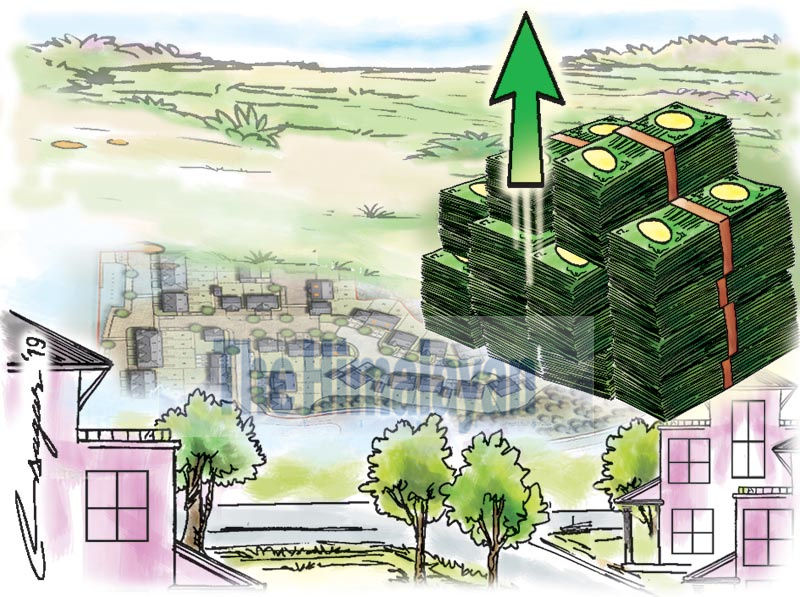Scientific land use: Gateway to prosperity
Although the federal, provincial and local governments all share the responsibility of shouldering land issues, local governments need to be strengthened enough so that they can manage and regulate them
Land is the ultimate resource that plays a pivotal role in the national economy. The Nepali economy has been in perennial recession, and inaction regarding rational land management seems to be a major factor. Whatever the priorities of economic development - agriculture, tourism, industry - land offers a fundamental ground for their development.
Despite its importance in the overall national economy, land issues have never been taken up seriously. Land in Nepal is used at random, and as a result, degradation and loss of agricultural land, encroachment of public land and chaotic settlements prevail.
Primarily the agriculture sector has experienced a huge setback to its growth due to fragmentation and constriction of agricultural land, leading to decreased production. Although various land-related acts and provisions have been made since 1910 BS, their priority was on recording the database and collecting revenue rather than proper land use and management. Scientific land management has only been a political slogan and never been realised. An inefficient bureaucracy and political rhetoric regarding land use are largely responsible for the present land use status in Nepal. In particular, land use issues are becoming more critical in urban management.
Increase in land price, government difficulty in acquiring land for public facilities and infrastructure as well as chaotic urban development are land specific problems in Nepal. A probe into these problems show that increased remittance is a factor in increasing the purchasing power of the Nepali people. Simultaneously, concentration of the population in the major cities and excessive capital flow into the unproductive sector is noticed, resulting in speculative land investment and ultimately high land prices. The price of land affects land use, public interests and ultimately social and economic conditions. Hence, high land prices have been a huge challenge for sustainable development.
In this context, land price control becomes crucial, but sudden control or cessation of the land market will be unwise, as it could lead to the collapse of the economy as in Japan in 1990. Rather we need a land law that acts as a driving force for normal supply and demand relationship, and sound land prices; sets forth the bases for more specific land policies; allows appropriate land tax policies; contributes to stability of societal development and establishes the fundamental principles of land use.
These principles are: public interests in land are superior to private interests; land use shall be made appropriate to an area’s natural, social, economic and cultural conditions; speculative investments in land shall be restrained; and appropriate burdens shall be placed on the parties profiteering from increases in land prices.
The first principle of land use has been at times interpreted as being paradoxical to individual property rights as ownership of land in Nepal is treated as individual property. Article 25 of the new constitution states that the right to own or to hold property is inviolable. But under clause 4 of the same article, it is also stated that there will be no obstructions in carrying out land reforms, management and regulation by law in order to increase the production and productivity of land, modernise and commercialise agriculture, environment protection and for managed housing and urban development. Hence, we have sufficient ground to implement this principle of land use.
To effectuate these principles, the government needs to regulate land transactions to create appropriate land prices and eliminate the evil effects of inflationary land speculation on the citizens.
On the way towards curbing land prices, one important tool is land taxation. The national governments should publicly announce “normal” land prices facilitating appropriate land taxes and prices. Further, it must try to plan for balanced and rational land valuation. The nation and local governments should be authorised to consider the unique characteristics of the given region, and if it is deemed applicable, place appropriate burdens on parties profiting from “social capital” services. Such burdens may not be limited to monetary burdens. Governments should have the authority to enact “appropriate” tax policies in order to maintain “fair” tax burdens.
A “land transaction surveillance system” should also be incorporated into the land use laws, which subjects land transfers within the designated areas to either approval or notification process.
In Nepal, land reforms have always been in the shadows, and no attempt has been made to identify the genuine problems. Now is the right time to push for it as this government has a convenient majority, and state restructuring also offers a substantial platform to gear up the actions in a novel way concerning scientific land management.
Although the federal, provincial and local governments all share the responsibility of shouldering land issues, local governments need to be strengthened enough for their management and regulation. The national and local governments must also conduct surveys on land-related issues in order to effectuate their planning of “comprehensive and efficient” policies on land.
Keeping in mind that the fundamental activities related to land are living and production, we can materialise the people’s dreams of development and prosperity with proper land use.





